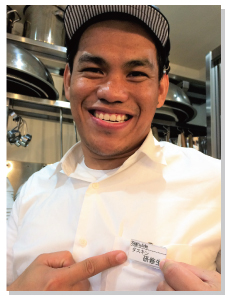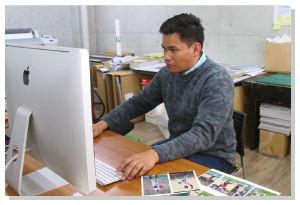- HOME
- Alumni News
- Christopher Amomonpon (participated in the 18th Program)
- Kit's Final Report
Kit's Final Report
Final Report
Introduction
The Philippines is a nation of islands, with 7,107 islands of all sizes. My hometown of Lapu-Lapu is a tourism city in Cebu, boasting beautiful beaches. It is also a place where Lapu-Lapu, our national hero, was born.
I had hearing impairment from birth. Of my five siblings, my elder and younger sisters are deaf. My parents have a good understanding of deaf people and they also advocate for the rights of the deaf. My father, being self-employed, employs two deaf people. My mother is a volunteer sign language interpreter. Because of my parents’ influence, I developed an interest in volunteer work for people with disabilities. It did not take long before it turned into a passion to support deaf people.
Being hard of hearing, I usually use a hearing aid. As I was going to a regular local school instead of a deaf school, I always had communication problems. When I was 26, I started to get involved in deaf activities, learned sign language and about deaf culture. How wonderful it was to be able to communicate with others! It was so fun to spend time with deaf people, but at the same time, I began to understand deaf people were living a very hard life. They told me there was no sign language interpreter system, nor employment opportunities, and they also faced a lot of discriminations. There are both hearing and deaf members in my family, but we are living very happily together. I am sure that deaf people and hearing people can live together in society too. I began to feel that I wanted to be someone to bridge that gap.
The government of Lapu-Lapu cites inclusive society as their goal, and they are providing support to people with disabilities as part of their social welfare services. However, support for deaf people was behind those for people with other disabilities, because Lapu-Lapu did not have any support organizations of or deaf people. Because of this, in 2013, 15 volunteers got together and established Deaf Association of Lapu-Lapu City. We launched activities, with the vision to strengthen the connection between the members of the association and the local community. However, as we were new, we faced many challenges. How can we remove communication barriers? How could we enlighten the society? To acquire knowledge and experience needed to solve these issues, I decided to take part in Duskin training. Reflecting on the needs of deaf people from my local community, I visited Japan with four goals in my mind.
- To learn about sustainable organization management
- To learn about education for deaf people
- To learn about how Japan supports deaf people’s communication, and
- To learn about the life of deaf people in Japan

Learning Japanese and Japanese sign language
For the first three months, I studied Japanese and Japanese sign language. It was fun to study hiragana and katakana, and easy, but as the class progressed, it got harder as more kanji and grammar got introduced. However, thanks to my teachers’ efforts and encouragement, I managed to continue my learning without giving up, to the point where I could even write weekly reports in Japanese. Japanese was very useful in establishing good relationships with Japanese people. It was the first time I had learned sign language from deaf teachers, which made the sign language class very interesting.
Homestay
I stayed at the home of the Kubozaki Family from the end of the year to the New Year. The mother was hard of hearing like me, and we communicated a lot in sign language. I really enjoyed the culture of the Japanese New year, visiting the shrine as soon as the New Year started, admiring the first sunrise of the year, and enjoying specially prepared Japanese New Year home-made dishes known as “osechi”. The family also took me to a hot spring and a ninja village. I would like to express my gratitude to the Kubozaki Family who treated me like family. Thank you very much.
Individual training
1) Sustainable organization management
I studied how to run an organization at Asahikawa Deaf Association, Sapporo Association of the Deaf and Hyogo Association of the Deaf. The common thing about these three organizations was their wonderful organizational structure. It also left a strong impression on me to see deaf and hearing people working together. They were also working in cooperation with the government, local communities and stakeholders. Notably, there was a lot of cooperation with the government, for example, getting support from the government when offices were established, or the government assigning them contracts for sign language interpreter development or outsourcing. I also witnessed some cooperative efforts with the government in daytime workshop management. I would like to make this kind of partnership happen in the Philippines too.
2. Ensuring information accessibility for deaf people
In the Diploma Course for Sign Interpreters, National Rehabilitation Center for Persons with Disabilities and National Center of Sign Language Education, I learned about how to develop and outsource sign language interpreters. The knowledge I gained can be applied to develop a sign language class and a sign language interpreter course in Lapu-Lapu. At Sapporo Association of the Deaf, I learned about how to edit movies, and insert subtitles and sign language interpreter images in the corner of the video. I also learned about how to plan and conduct interviews, so I understood how to create interview movies while ensuring information access for deaf people.
3. Deaf education in Japan
I had the opportunity to visit Asahikawa School for the Deaf, Hokkaido High School for the Deaf and Tsukuba University of Technology. I was very impressed to see most of the teachers were fluent in sign language. Through sign language, deaf students can get complete information from the teachers. Complete information makes deeper understanding possible. Education eventually leads to employment. I strongly realized that, for deaf students, it is extremely important that instruction sign language is guaranteed at educational institutions.
4. Current situation surrounding deaf people in Japan
In the Philippines, there are many deaf people who cannot get any job even though they are willing to work. Social Cafe Sign with Me is a café established and managed by deaf people. I learned how to help with cooking and wait on customers at the café. In Japan, more politeness and courtesy are expected in customer service than in the Philippines, so I was confused at first. I gradually got used to it though, and began to enjoy interacting with customers. The official language within the café is sign language, but people who cannot do sign language can point at the menu photo to place orders. I would like to open and run a café in the future, where I can hire deaf people, where everyone can come and enjoy their meals whether they are deaf or not.
At Totto Cultural Institute, I did some light work with deaf people with multiple disabilities. It was fun to work and chat together.
I also visited two elderly homes for elderly deaf people. I did not just observe how things were done there, but also learned how to help them. It was very nice to have the opportunity to interact with the residents. They told me many stories about how deaf people of Japan used to live. They said deaf people frequently faced discriminations and had a hard life, but things gradually got better, thanks to the efforts of deaf associations. It was very touching to hear these stories.

My goals after returning home
There are many things I want to do after I return home. First, I would like to transmit the knowledge and experience I gained in Japan, that answers my initial four goals, to the staff of Deaf Association of Lapu-Lapu. If I can communicate this information properly, we will be able to work efficiently.
In future, I would like to cooperate with other disability organizations, the government, and organizations of the hearing, to make Lapu-Lapu an inclusive society. But that will not be the end of our mission. We need to transmit our expertise to other islands and expand the inclusive society. If the deaf organization of each island becomes strong and sustainable, we will be able to support our mother organization Philippine Federation of the Deaf by ourselves. By making their activities more active, I would like to eventually improve the welfare for people with disabilities across the Philippines.
Lastly
For 10 months, many people in Japan supported me. I am truly grateful. I would like to express my gratitude to the Duskin family, Duskin AINOWA Foundation, Japanese Society for Rehabilitation of Persons with Disabilities, my Japanese and sign language teachers, my teachers at the workshops and lectures, my host family, and everyone else who walked into my path. Thank you so much.




